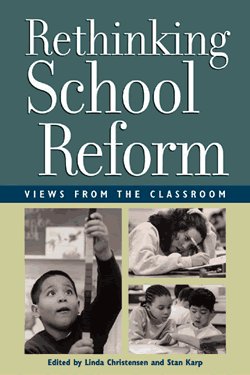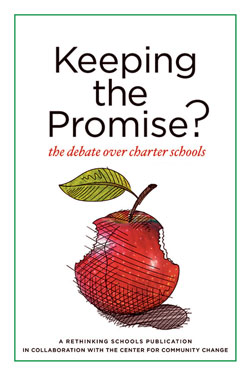A recent Education Week article reported that between 2009 and 2011, 3,700 public schools in the US were closed. Reuters reported that school closings in 2010-11 were up 60% from ten years earlier. The current wave of school closings is part of a bipartisan corporate reform assault on public education, especially in communities serving poor communities of color. The good news is communities are fighting back. The article below tells one such story.
– Stan Karp
Crenshaw School Community Fights For Real Improvement and Against LAUSD Superintendent’s Scorched-Earth Approach
by Christina Lewis, Crenshaw High Special Education Teacher; Irvin Alvarado, Crenshaw High Alumni; Alex Caputo-Pearl, Crenshaw High Social Justice Lead Teacher, UTLA Board of Directors, Coalition for Educational Justice Organizer; Eunice Grigsby, Crenshaw High Parent, Crenshaw High Alumna
On October 23, LAUSD Superintendent Deasy announced he intends to reconstitute Crenshaw High School. This scorched earth “reform” that is destructive for students, communities, and employees has been used at Fremont, Clinton, Manual Arts, and more in LAUSD, despite courageous push-backs at those schools.
The Crenshaw school community is determined to fight back. The slogan that permeated the emergency 150-person Crenshaw Town Hall Meeting at the African-American Cultural Center on October 4 crystallizes the struggle — “Keep Crenshaw: Our School, Our Children, Our Community.”
In an attempt to disarm the push back and win public support, Deasy is combining the reconstitution with a full-school magnet conversion. Crenshaw stakeholders are, of course, open to conversations about changes that will improve conditions and outcomes for our students–but those must be collaborative, well-resourced, and must serve all students. That said, it is clear that Deasy’s main objective is not magnet conversion – it is to take top-down control of the school and reconstitute (which means removing all faculty and staff from the school, with an “opportunity to re-apply”).
The school community says NO to any form of reconstitution, and YES to school improvement that includes stakeholders and holds LAUSD accountable for its years of neglect and mismanagement.
In this spirit, teacher, parent, and administrator leaders of Crenshaw’s nationally-recognized Extended Learning Cultural model have been reaching out to Deasy to work in collaboration for over a year and a half. He has not responded. It’s clear that Deasy has cynically set Crenshaw up – persistently ignoring calls to meet when it is about something locally-developed and progressive; later, acting as if nothing is happening at the school, and dropping the reconstitution bomb.
The Extended Learning Cultural model has been developed over the last few years at Crenshaw – a school of approximately 65% African-American students and 35% Latino students, with approximately 80% with free and reduced lunch. The Extended Learning approach is to teach students standards-based material wedded with cognitive skills used in real life efforts to address issues at school, in the community, and with local businesses. Cultural relevance, Positive Behavior Support, parent/community engagement, and collaborative teacher training and excellence are foundations of the program. Students engage in rigorous classroom work, as well as internships, job shadows, leadership experiences, school improvement efforts, and work experiences.
The Extended Learning Cultural model is fundamentally about extending the meaning, space, and time of learning, and extending the school into the community and vice versa. This rooting of learning into a context is essential for students who have been constantly uprooted and destabilized by economic injustice and by a school system that focuses on narrow test-taking rather than cultural relevance. Extended Learning could be enhanced dramatically for our students with LAUSD support. Instead, by threatening it, Deasy is jeopardizing Crenshaw’s progress, outside partnerships, and outside funding.
Moreover, the Extended Learning Cultural model is supported by research – it draws from the Ford Foundation and various progressive academics’ national More and Better Learning Time Initiative, and it has been developed at Crenshaw with USC, the Bradley Foundation, and other nationally-recognized research partners.
In contrast, the research shows that reconstitutions are not good for students. Reconstitutions cut students off from faculty and staff they know, from programs they are involved in, and from the communities surrounding their schools. Districts reconstitute schools in working class communities of color, creating more instability and uprootedness for students who are often our most vulnerable. Reconstitutions are educational racism. For more details, see a brand new study from UC Berkeley and the Annenberg Institute at Brown University.
Extended Learning showed results at Crenshaw in its first year of partial implementation, 2011-2012, after 2 years of planning. Crenshaw dipped on some indicators between 2009 and 2011 when the school had a principal who wasn’t the first choice of the selection committee, who was imposed by LAUSD, and who did not work collaboratively. However, when the school regained focus around Extended Learning in 2011-2012, the data show growth, including:
- Meeting all State of California API growth targets except for one, often far exceeding the targets (for example, a 92 point API gain among special education students);
- Reducing suspensions and expulsions;
- Achieving substantial growth among African-American students on the API, reaching API levels significantly higher than African-American students at many other South LA high schools;
- Achieving an explosive increase in math proficiency levels among Limited English Proficient students on the California High School Exit Exam;
- Achieving a huge jump in proficiency levels in math on the California Standards Test among all 10th graders;
- Including many more students in internships and work experiences;
- Organizing more partnerships for wrap-around services for students;
- Increasing parental involvement.
Yet, Superintendent Deasy wants to disrupt this trajectory of growth and reconstitute Crenshaw. Worse yet, he wants to do this without any consultation with the community, parents, students, alumni, faculty, and staff. Part of his agenda is to curry favor with the national scorched earth “reform” movement. Another part is straight union-busting. He has said many times he doesn’t like the teacher union leaders at Crenshaw – many of the very leaders who have been at the forefront of building the Extended Learning Cultural model, its national connections, and the growth that has come from it.
Not surprisingly, other schools that have been reconstituted in LAUSD have undergone “re-application” and “re-hiring” processes that have been highly suspect – unrepresentative hiring bodies, discrimination against older staff and teachers of color, and discrimination against staff based on political issues.
The Crenshaw school community has a strategy to win the push back against Deasy’s reconstitution and to win support for the Extended Learning Cultural model and other enhancements:
- Amidst Deasy’s intense destabilization efforts that affect the school daily, educators, staff, and parents are working with site administration to tighten up school operations as much as possible;
- The school community is deepening, refining, and broadening engagement around the Extended Learning Cultural model;
- Faculty and staff have strongly solidified against reconstitution internally;
- School stakeholders are building on years of work with a unique coalition of community partners to organize parents, students, alumni, and community. This coalition includes Ma’at Institute for Community Change; African-American Cultural Center; Black Clergy, Community, and Labor Alliance; Labor/Community Strategy Center; Coalition for Black Student Equity; Coalition for Educational Justice; Sierra Club; Southern Christian Leadership Conference; Park Mesa Heights Community Council; and more.
- The coalition is working closely with United Teachers – Los Angeles. The House of Representatives voted unanimously to support the Crenshaw struggle. UTLA West Area and Progressive Educators for Action (PEAC) are critical supports for the ongoing organizing.
At the moment, the organizing will focus on the two places Deasy needs to go with his destructive plan for approval – the LAUSD School Board and the California Department of Education.
On the latter, Deasy cannot undermine Crenshaw’s plan for its federal School Improvement Grant, SIG, without communicating with Crenshaw’s School Site Council (SSC) and communicating with Sacramento, because the grant is administered by the State. Yet, the Superintendent is moving forward with undermining Crenshaw’s plan for this federal grant – that would bring close to $6 million to resource-starved Crenshaw High – without consulting with the SSC or with school stakeholders, and without a discussion of other monies that could be jeopardized through his destabilizing of the SIG plan. Further, Deasy’s undermining of the federal grant is occurring after only 3 months have passed in Crenshaw’s implementation of its SIG plan – an implementation that has, thus far, met its immediate goals, and has supported some of the Extended Learning Cultural model’s main foundations.
The Crenshaw school community knows that the eyes of the city, state, and nation are watching Crenshaw. If Deasy gets his way at Crenshaw, it further opens the door to these kinds of moves everywhere – including places he’s already attacking locally with similar reconstitution efforts, like LAUSD’s King Middle School, and far more. On the other hand, if Crenshaw is able to organize with school and community to push back on Deasy and to further advance a deep and hopeful educational and racial justice-based reform, its reverberations will be felt incredibly widely.
Keep connected to the struggle and “like” our Facebook page – Crenshaw Cougars Fighting Reconstitution – and be in contact with us through email at caputoprl@aol.com.
Related Resources
Challenging Corporate Ed Reform and 10 Hopeful Signs of Resistance, by Stan Karp
Arne Duncan and the Chicago Success Story: Myth or Reality?, by Jitu Brown, Eric Gutstein, and Pauline Lipman
“I Thought This U.S. Place Was Supposed To Be About Freedom” : Young Latinas Engage in Mathematics and Social Change to Save Their School, by Maura Varley Gutierrez
 Rethinking School Reform: Views from the Classroom, edited by Linda Christensen and Stan Karp. Informed by the experience and passion of teachers who walk daily into real classrooms, Rethinking School Reform examines how various reform efforts promote — or prevent — the kind of teaching that can bring equity and excellence to all our children, and it provides compelling, practical descriptions of what such teaching looks like.
Rethinking School Reform: Views from the Classroom, edited by Linda Christensen and Stan Karp. Informed by the experience and passion of teachers who walk daily into real classrooms, Rethinking School Reform examines how various reform efforts promote — or prevent — the kind of teaching that can bring equity and excellence to all our children, and it provides compelling, practical descriptions of what such teaching looks like.

Keeping the Promise? The Debate Over Charter Schools, edited by Leigh Dingerson, Barbara Miner, Bob Peterson, Stephanie Walters. This wide-ranging and thought-provoking collection of essays examines the charter school movement’s founding visions, on-the-ground realities, and untapped potential-within the context of an unswerving commitment to democratic, equitable public schools.
